Kagi is fresh air for search
/ ~1,500 words
updated:table of contents
Search
I love reading stuff that’s a bit off the beaten path — niche writing that you won’t find in a pop-sci book, personal blogs that exhibit a super distinctive authorial voice even if they might not get tonnes of traffic, reference books that categorize and assemble objects in unexpected ways. This interest was no doubt formed during my childhood summer breaks, when I’d spend days methodically skimming the 20-odd volumes of the family’s pre-19891 Funk and Wagnalls to learn about every topic that was fit to print. I spent so much time in those books that I’m pretty sure I memorized the first and last headwords in every volume. (Don’t ask me to recall them now though; I can hardly remember what I had for supper yesterday.)
Basically, learning weird stuff is fun and I try to do it as often as I can. And search is the lifeblood of esoterica. Imagine looking for a specific book in a heap of thousands without a library classification! So when I got into computers, search opened up a whole new world for me. It was like gaining the ability to see the entire encyclopedia on demand, and in real time.
Like everybody else, I used Google pretty much exclusively. I did try switching to DuckDuckGo for a while for privacy reasons, but the results felt inferior to Google’s, and I found myself relying on the !g bang a lot. Eventually I noticed that I was using it in every search query, and decided to just switch back to Google.
But in recent years, there have been increasingly (opens in new tab) many (opens in new tab) complaints (opens in new tab) about the quality of Google’s search results. Needing to append "reddit" to most queries if you want intelligible results is proof positive that something’s awry.2 There’s a constellation of potential causes here, ranging from SEO spam to Google degrading the core UX by sunsetting legitimately (opens in new tab) useful (opens in new tab) search (opens in new tab) features (opens in new tab) or the rise of non-searchable web communities like Discord. I claim no special knowledge in this domain, but my money’s on the perverse incentives arising from simultaneously owning global search and the default advertisement auction marketplace, and the SEO feedback loops that spawn due to that… curious market position.
What’s tricky though is that if you believe the criticisms, then Google’s downfall is a bit of a sorites paradox. Yes, search has gotten worse, but the decline has been so gradual that it may not have jumped out at you at any particular moment. It didn’t for me, at least not for a long time.
Kagi
My email records tell me I joined the Kagi private beta in April 2022, probably after seeing it mentioned in a Hacker News comment. For whatever reason it didn’t stick because I just went back to Google — I think I might have been concerned about blowing through the number of monthly searches in the $5 tier? At any rate, I didn’t log any Kagi activity until September 2023, when I reassessed the product and ended up paying for the Professional tier ($10 monthly).
Kagi promises a better user experience than that of ad-supported search providers, and do they ever deliver! The results dominate Google’s: no sponsored content pinned to the top of the results, no videos or AI-summarized nonsense polluting the page, and better ability to surface niche content. All this makes it significantly faster and easier to find what I’m looking for.
Core search
Kagi offers lenses that search specific subsets of the internet; think of them as really efficient hotkeys for search. There are lenses for recipes, web forums, .edu domains, PDFs, and so on. You can also create your own lenses. My favourite by far is the Small Web lens, which lets you search a collection of small, often handcrafted websites written by actual humans, with posts published in the past week. It’s a super cool way to browse recently updated sites that aren’t mediated by a tech giant. If you don’t want to search for a specific term, you can also browse random posts at the Small Web (opens in new tab) front page. This works even if you don’t have a Kagi subscription.
What follows is a non-exhaustive look at some areas where Kagi has really impressed me. These examples don’t necessarily represent the best or most important reasons to consider switching, but they’re definitely things I’ve appreciated. First, a super simple example based on a genre of query I submit frequently; this one’s about building a specific kind of patch on a Eurorack modular system:
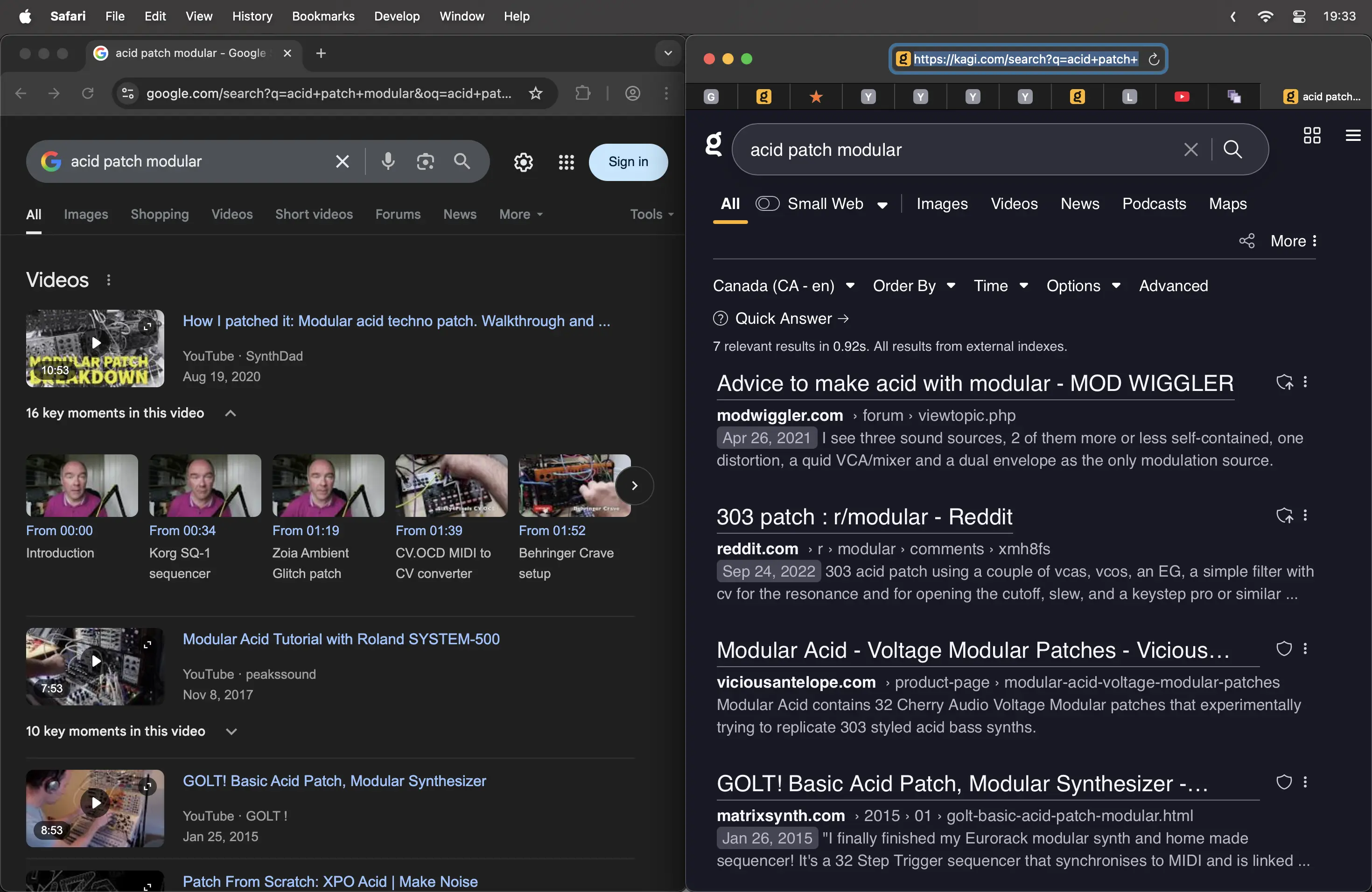
Nearly the entire Google page (okay, it’s in half-screen mode on a 13-inch MacBook Air, but still) is taken up by YouTube videos that I can’t search to figure out if they’re any good, or by completely useless stills from those videos.3 The definitive modular web forum, Mod Wiggler, isn’t even visible on the page! Contrast with Kagi, which gives me what I’m looking for without needing to scroll an inch.
For another example, let’s say I want to research Framgate, a controversy that occurred on English Wikipedia in 2019. This is a good test because there’s a neighbourhood in Bangladesh called Farmgate, and lots of people seem to misspell Farmgate as Framgate. So we’ll see how many bad results appear even after I quote-wrap my query:
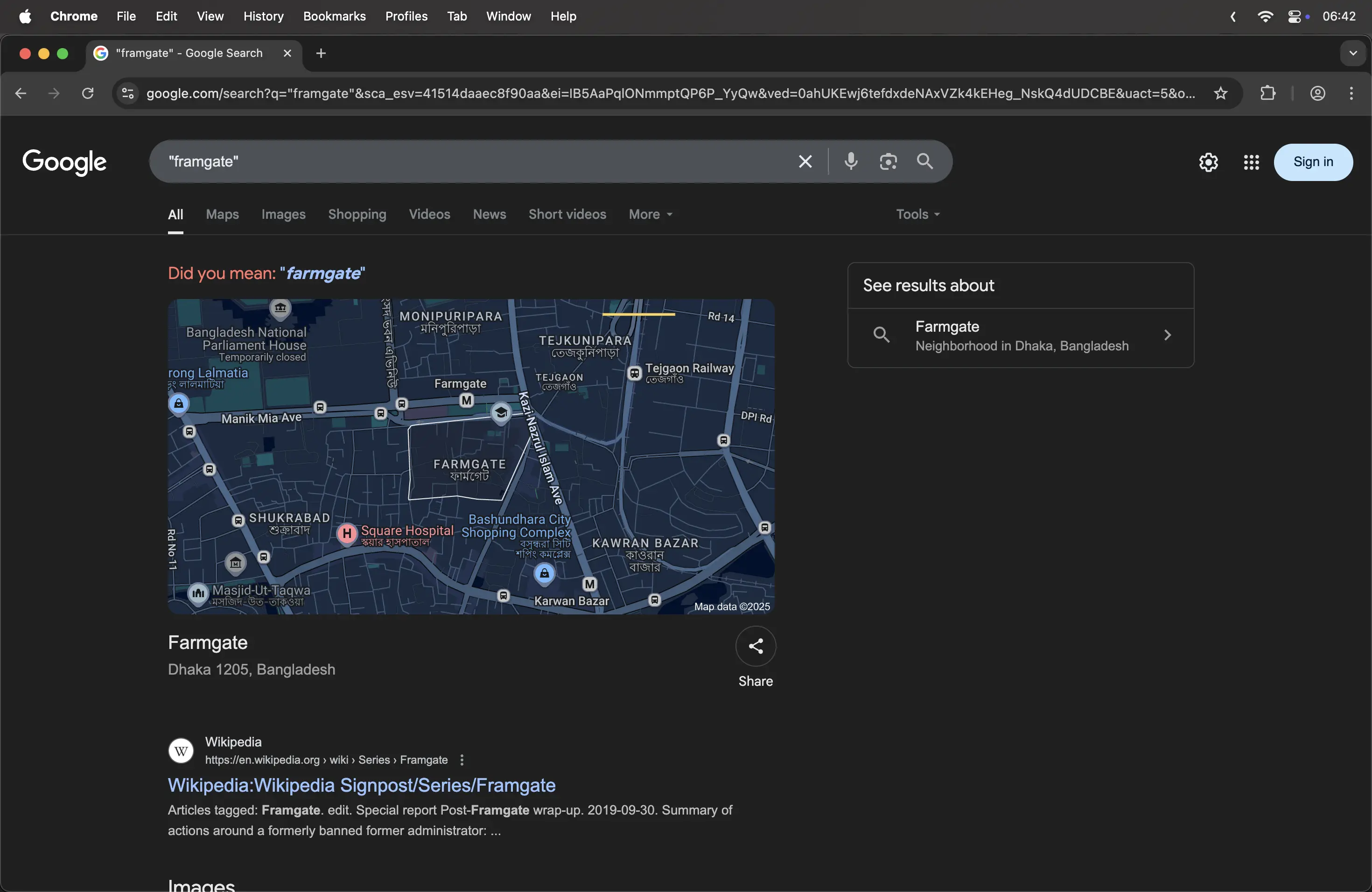
Google refuses to believe that I actually want to see "Framgate" and insists on showing me a useless map and sidebar item about the neighbourhood. Basically, Google trusts aggregate search data more than it trusts me, even after I tell it precisely what to do. Not great for niche search! Now let’s look at Kagi’s results:
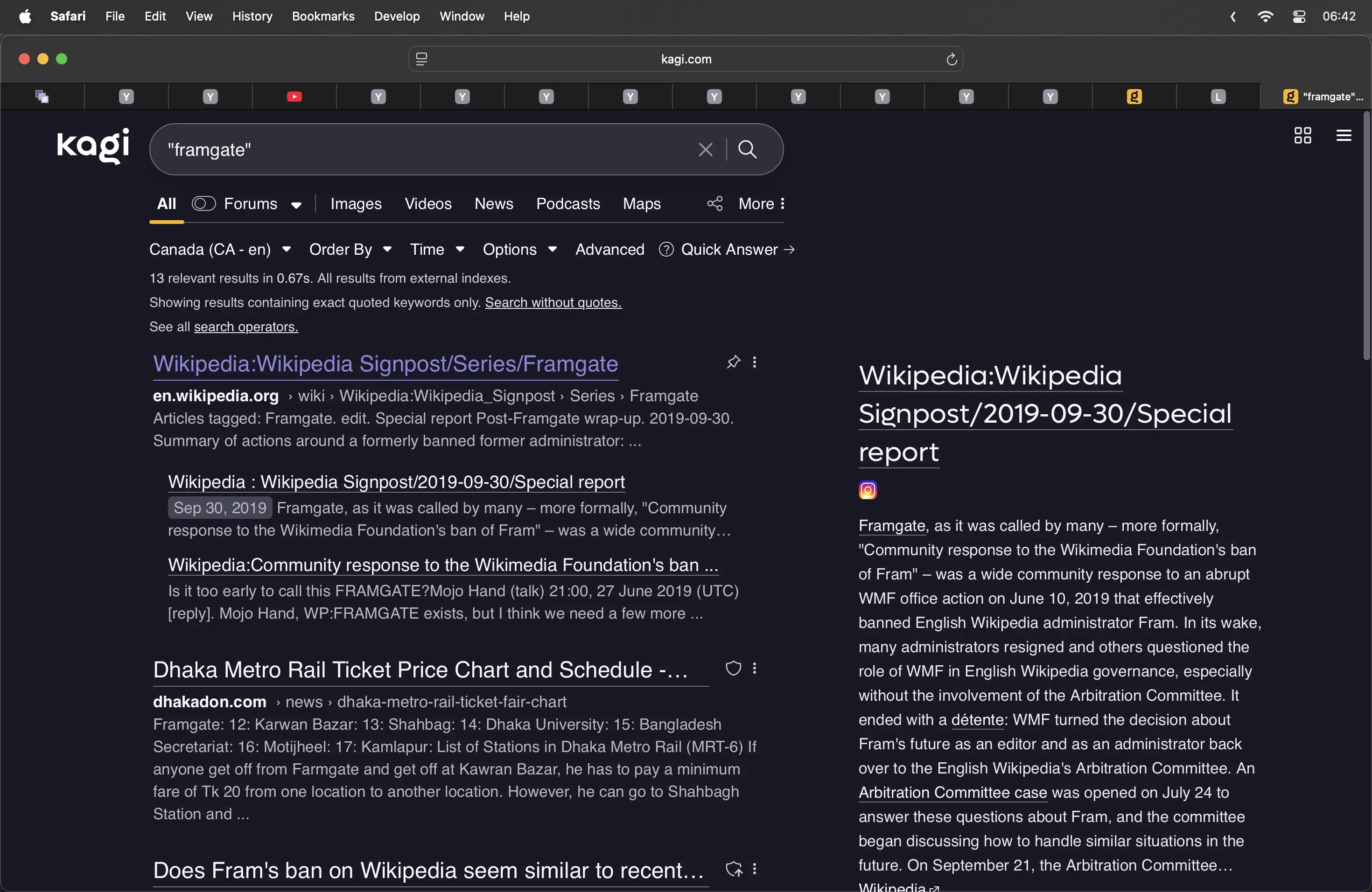
These results are much cleaner in my view. Instead of a useless map, we get a helpful sidebar about the Wikipedia Signpost, which provides an excellent overview of the events in question.
One way Kagi fights spam is by grouping listicles and surfacing discussion pages. This is especially useful when you’re doing product research or shopping, because discussion forums become more easily discoverable…
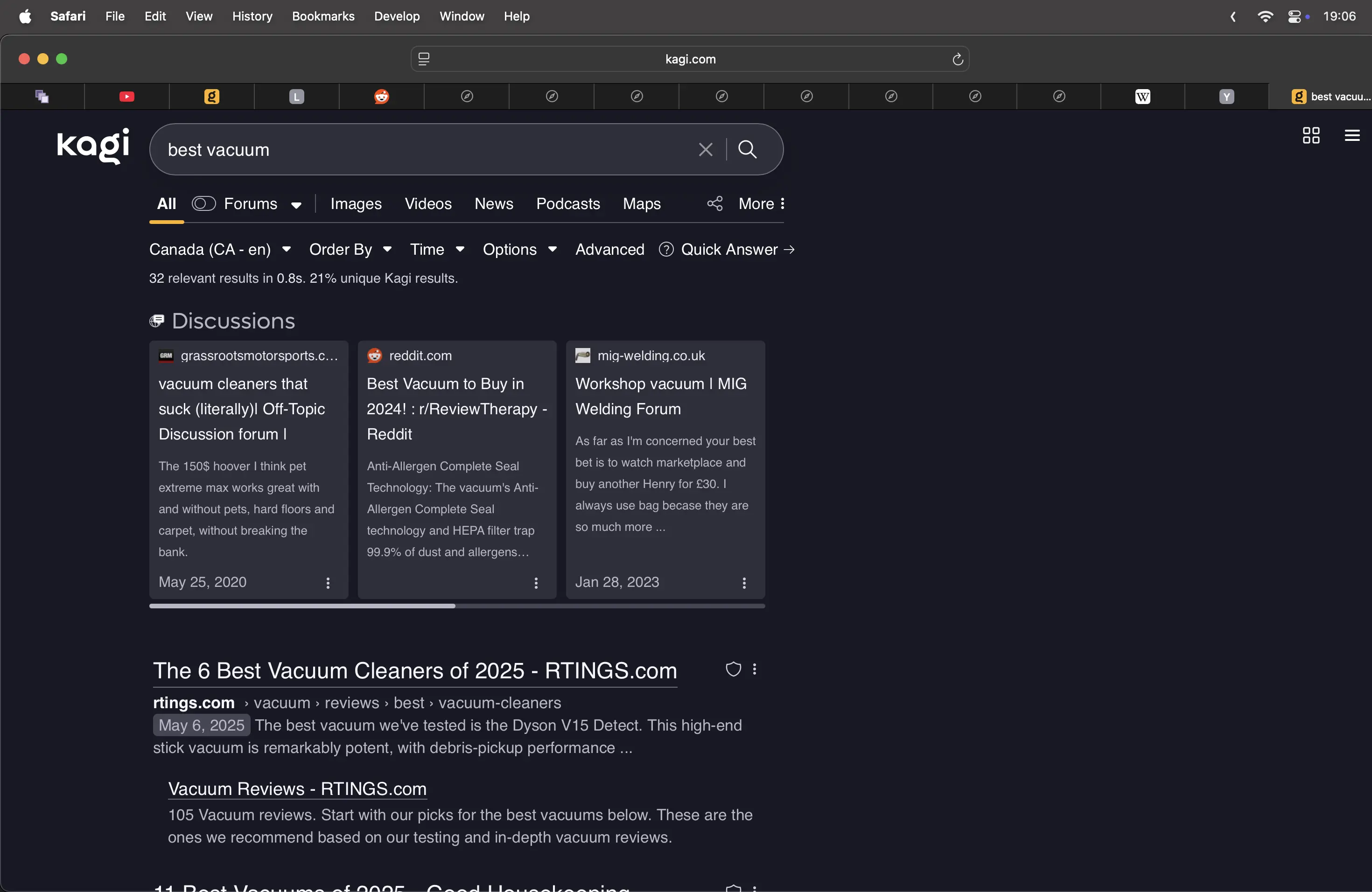
… and listicles are more easily ignored. (Sorry Wirecutter, but you’ve fallen off!)
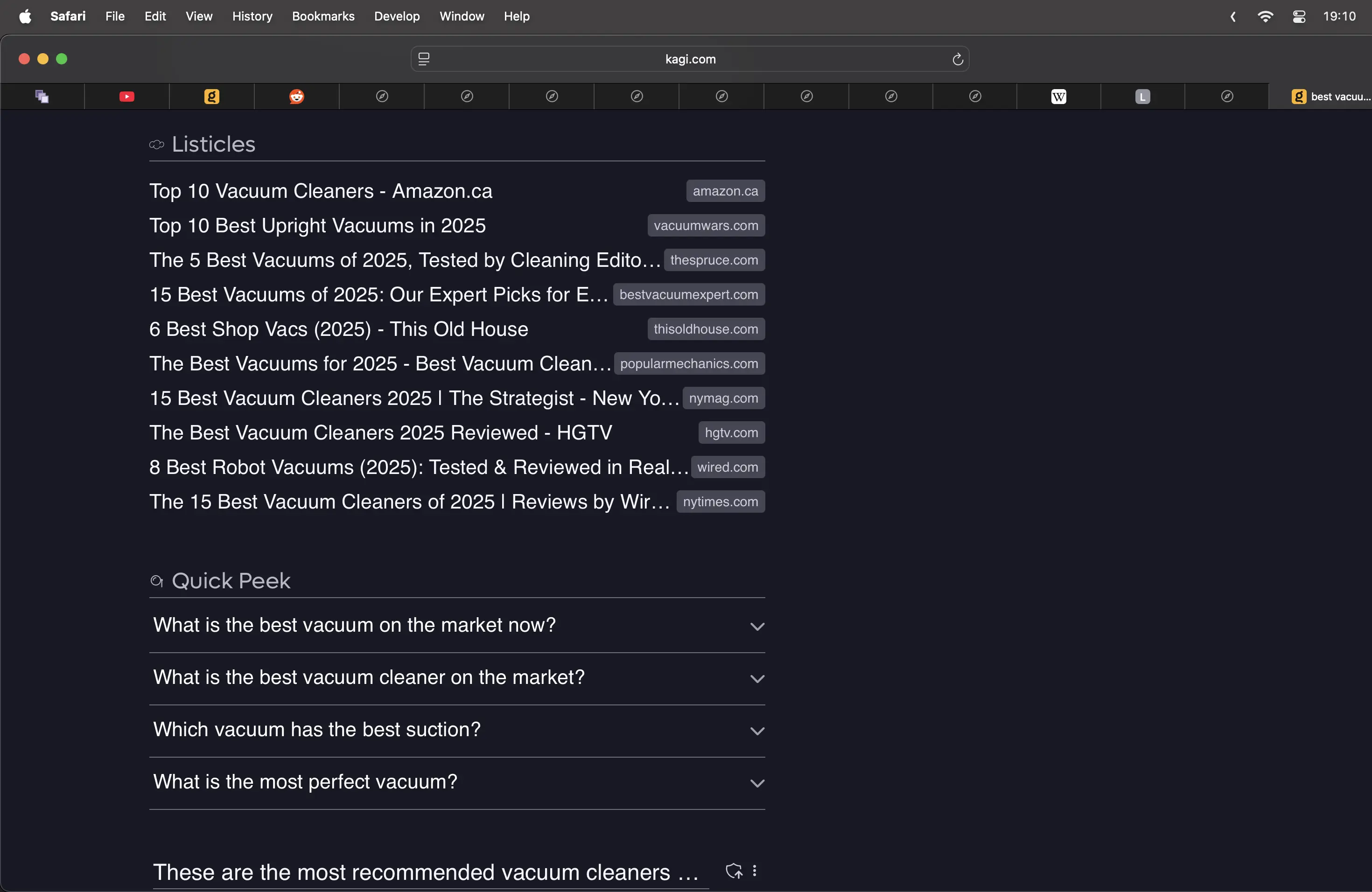
You can also adjust the relative ranking of sites in Kagi’s results. (You might have noticed this in my earlier screenshots; the little pushpin and shield-with-arrow icons next to search results indicate that they’ve been boosted.) So you can push StackOverflow to the top of your search results, or if you hate Pinterest links then you can block the domain entirely. As you can see, I’ve got Wikipedia pinned for super easy access, and I raise Reddit and a few other useful sources to minimize scrolling. The block list is also a lifesaver.
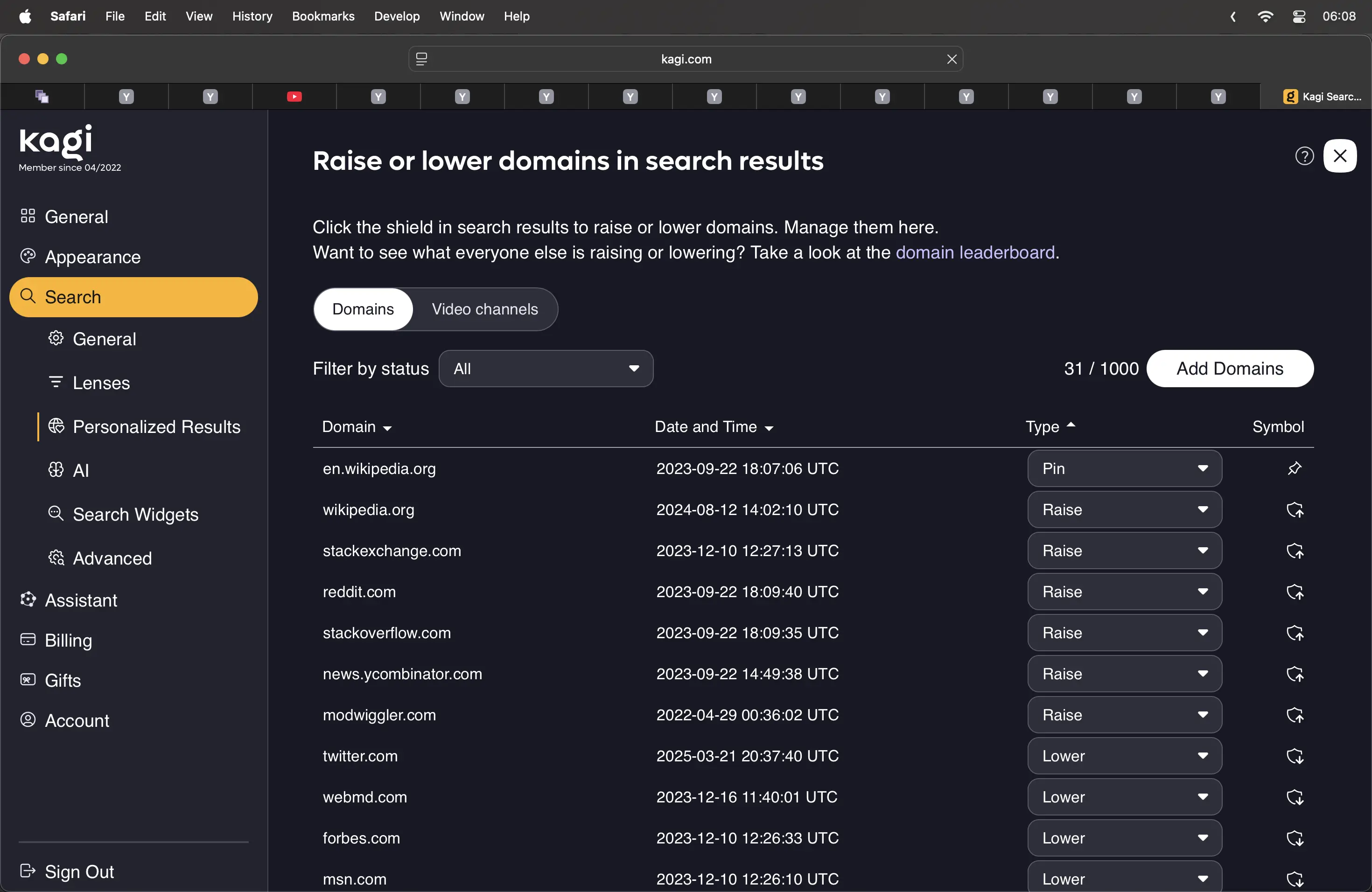
There are a couple small areas where Kagi might need some polish. For example, sometimes Google’s styling can feel a bit cleaner, like with these flight tracking widgets. But on the whole I’m really enjoying the Kagi experience.
![]()
Other considerations
Kagi works great on iOS too, although the setup in Safari (opens in new tab) is a little involved due to the weird, cobbled-together way that Safari Extensions work. Kagi also offers a huge number of other web features and products, from AI services like its multi-model Assistant (opens in new tab) or document and webpage summarizer (opens in new tab) to a novel approach to anonymized search (opens in new tab) and a literal web browser (opens in new tab). I haven’t interacted with these tools that much, but most of them are bundled in the $10 Professional tier. You may find them more tempting than I did.
I haven’t said much about the cost yet. For me it’s always worth spending a bit more for a better product, especially when it saves me time. I’ll admit that paying for search is a strange feeling at first, but in a world where every other weather app charges a monthly subscription fee, is it really that weird? Plus there’s the whole “you’re the product” angle to ad-based search that I probably don’t need to rehash here. So I’m happy to pay $10 as long as Kagi keeps delivering a fantastic niche search experience.
In their recently published 3-year anniversary blog post (opens in new tab), Kagi promises not just search but an entire user-friendly ecosystem of products that reflect their vision to become a “true internet company”. Given how they’ve absolutely knocked search out of the park, if their forthcoming services are on par, I think Kagi will be a real breath of fresh air not just for search but for the entire web.
Footnotes
-
I don’t remember the precise year of publication, but I distinctly recall that the East Germany entry didn’t mention anything about the Berlin Wall falling. ↩
-
This also seems like an indictment of the modern web, the theory being that 2010s-era web giants killed off the genuinely useful non-Reddit data sources. There’s a lot of truth to this, but as we shall see, I don’t fully believe that narrative. ↩
-
Kagi’s Universal Summarizer (opens in new tab) can actually summarize videos, which is extremely cool, but even so it requires an extra click. ↩